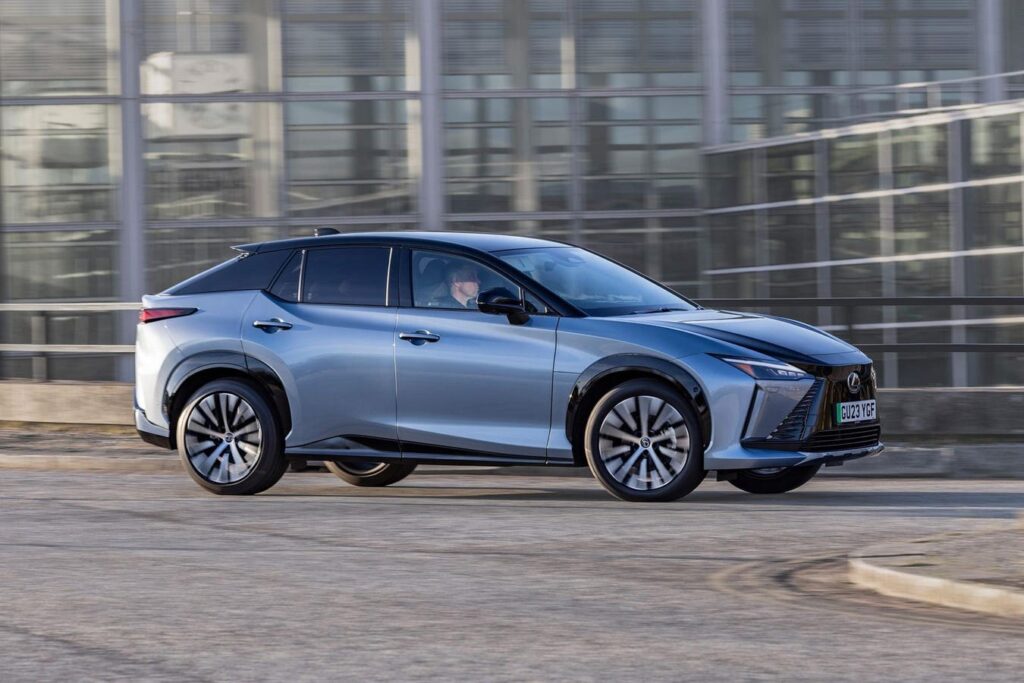The Lexus RZ450e represents a significant step for Lexus, as it transforms into a 4-wheel drive variant of the previously introduced RZ 300e. This move occurs during challenging economic times for the automotive market in Europe, where many manufacturers face decreased sales. However, Lexus is enjoying a rare moment of growth amidst this instability, showing an increase in sales driven by its push towards electric vehicles (EVs). Last year, Lexus set an ambitious goal to transition to a fully electric lineup by 2035 globally, with hopes to reach this milestone even earlier in Europe by 2030, depending on market conditions. Despite recent challenges in EV sales momentum, the brand remains committed to this long-term vision.
Distinct from its European performance, Lexus has established a formidable presence in the U.S. since its launch in 1989, where it sold 355,600 vehicles last year compared to just 69,200 units across Europe. This disparity highlights the challenges that Lexus faces in Europe’s premium automotive market, which tends to be dominated by established names such as BMW, Audi, Mercedes, and Porsche. This competition has proven difficult for other luxury brands attempting to penetrate this sector, resulting in failures for various automakers like Infiniti, Cadillac, and Acura. However, despite the competitive landscape, Lexus has noted a nearly 30% increase in European sales during the first eight months of this year, indicating a positive trajectory and the potential for increased market share.
Going forward, Lexus has set its sights on hitting the 100,000 annual sales target, with the brand’s current figures falling short when stacked against key competitors like BMW, Mercedes, and Audi, whose sales numbers significantly outpace Lexus. Nevertheless, Lexus is proving to be resilient amidst a challenging backdrop, reflecting the success of parent company Toyota, which has performed well, particularly in hybrid and plug-in hybrid sales. Jamel Taganza, from Inovev, noted that while Lexus is somewhat behind the German automakers in electrification efforts, the brand is taking a cautious approach, assessing market developments before fully committing to extensive EV offerings.
The urgency for Lexus to strengthen its electric vehicle offerings is underscored by market expectations; studies indicate that EVs can represent nearly half of the premium automotive market. The introduction of the RZ 300e is seen as a necessary step to maintain competitiveness in regions where rapid transitions to electric mobility are occurring, such as in Nordic countries. The RZ 300e is characterized as a higher spec version of the Toyota BZ4X, emphasizing its shared platform but unique position in the premium segment. Analysts like Matt Schmidt emphasize the importance for Lexus to adapt quickly and strategically to the evolving market landscape if it aims to compete successfully against German rivals.
In a reflective analysis of Lexus’s strategy, Benjamin Kibies points out that the brand’s commitment to remaining in the European market is beginning to yield fruitful results. Lexus emerges as the last surviving Japanese luxury brand in Europe, slowly increasing its share of the combined Lexus/Toyota sales. Currently representing 7.1% of these sales, Lexus is becoming integral to the overall strategy for Toyota, particularly as it plays a leadership role in the company’s electrification efforts. This synergy not only benefits Lexus in its branding and market positioning but also aids Toyota as it tests and innovates new electric technologies within its luxury division.
As Toyota gears up for future developments, including six new electric vehicles set to be launched by 2026, it positions itself to increase its global EV sales significantly. By the end of this series of rollouts, Toyota believes that around 20% of its total sales could consist of fully electric vehicles. Many of these upcoming models are expected to bolster the Lexus lineup, further integrating luxury and electrification as key themes for both brands. In summary, the path ahead for Lexus appears vibrant yet demanding, necessitating strategic adjustments and a keen sense of market evolution as it seeks to solidify its foothold in the premium electric vehicle sector.

